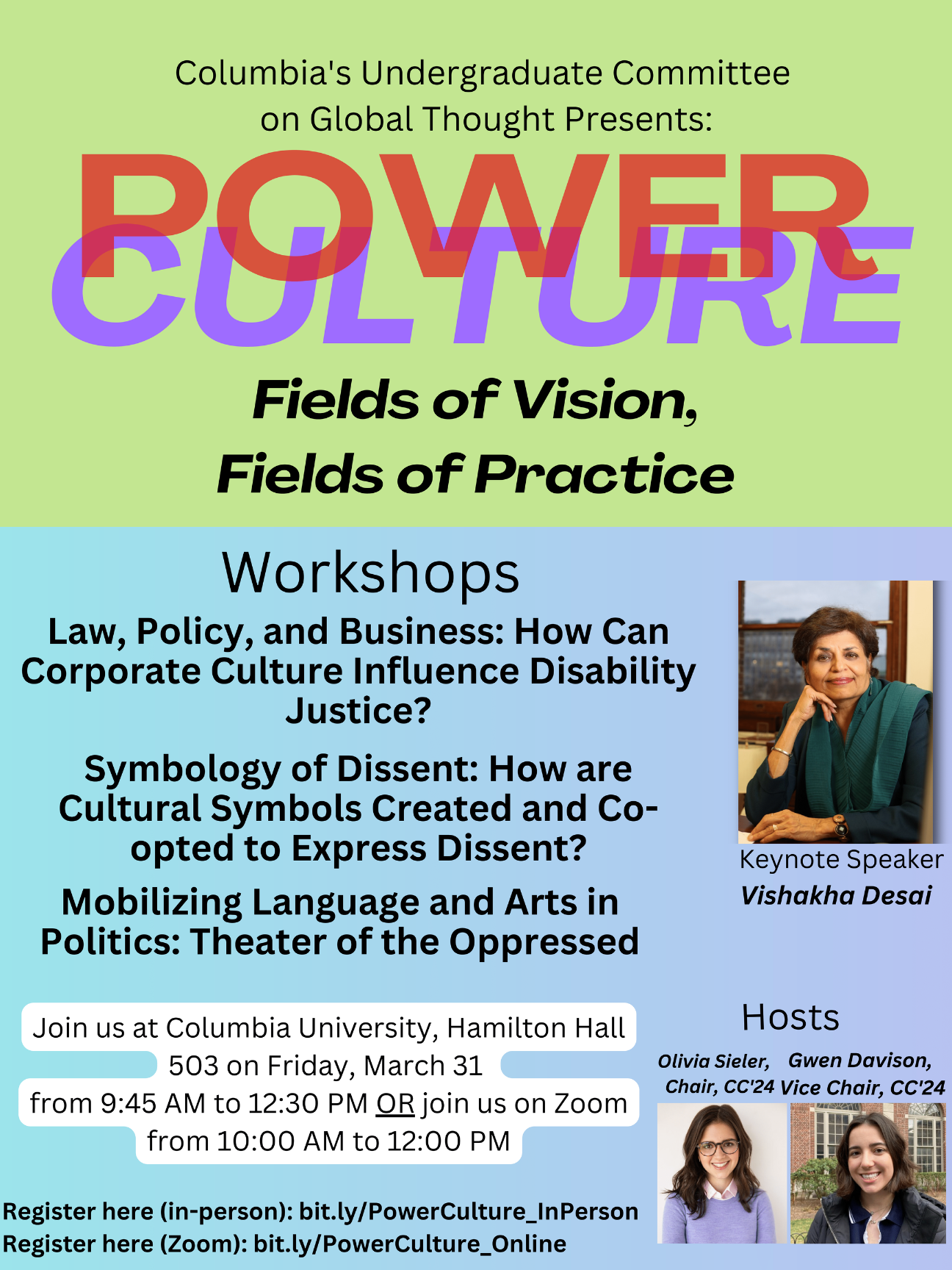
Power | Culture: Fields of Vision, Fields of Practice
By Olivia Sieler and Gwendolyn Davison
On March 31, 2023, the Columbia University Undergraduate Committee on Global Thought (UCGT) hosted its second annual conference, Power | Culture: Fields of Vision, Fields of Practice. The conference aimed to develop the theoretical and practical knowledge of undergraduate leaders so that they could better understand how concepts of power and culture are mutually reinforcing. Ultimately, participating students related the dialogue to the contemporary socio-political landscape to gain insight into how these frameworks impact people globally.
Keynote Address
The conference opened with a keynote address from Vishakha Desai, the Chair of the Committee on Global Thought, Senior Advisor for Global Affairs to the President of the university, and an internationally recognized expert on Asian art. During her address, Dr. Desai elucidated the similarities and differences between political and economic power –– “hard power” –– and cultural and social power –– “soft power.” Especially meaningful was her assertion that these two forms of influence exist in a continuous and ever-evolving dialogue with each other. Her speech set an inquisitive and open tone for participants as they entered their workshops.
Workshops
LAW, POLICY, AND BUSINESS: HOW CAN CORPORATE CULTURE INFLUENCE DISABILITY JUSTICE?
In the workshop Law, Policy, and Business: How Can Corporate Culture Influence Disability Justice led by Chair of the UCGT Olivia Sieler (CC ‘24), participants considered how a company’s culture interacted with laws and policies to influence the hiring and sustainable inclusion of employees with disabilities. To do so, participants examined the hypothetical multinational corporation, Pixel, and assumed the roles of different stakeholders, including the CEO, corporate DEI Team leader, In-house Counsel, and Employee Resource Group Leader. They then explored how Pixel could institute effective, inclusive hiring practices and probed the complex challenges of doing so. This session enabled students to understand how corporate culture functions as and interacts with more traditional systems of power to bolster or hinder diversity, equity, and inclusion.
SYMBOLOGY OF DISSENT: HOW ARE CULTURAL SYMBOLS CREATED AND CO-OPTED TO EXPRESS DISSENT?
In the workshop Symbology of Dissent: How are Cultural Symbols Created and Co-opted to Express Dissent? led by Vice Chair of the UCGT Gwendolyn Davison (CC ‘24), participants learned about the creation, proliferation, and impact of visual symbols of social justice. Undergraduates began by discussing recent symbols of particular urgency, including blank sheets of paper in the 2022 China COVID protests, the Black power fist in the 2020 Black Lives Matter movement, and the hijab in the Woman, Life, Freedom movement in Iran. They compared and contrasted the origins of these visuals of dissent and concluded that the symbols’ rich historical contexts and messages of solidarity made them particularly impactful. Participants then created their own symbols or analyzed a symbol of their choosing. This exercise allowed undergraduates to creatively engage with the theme and consider how the relationship between power and culture has shaped the aims and outcomes of social movements.
MOBILIZING LANGUAGE AND ARTS IN POLITICS: THEATER OF THE OPPRESSED
UCGT members prepared a third workshop on language and arts in politics that was not featured during the conference. The briefing for the workshop Mobilizing Language and Arts in Politics: Theater of the Oppressed can be accessed here.
The critical discourse among conference participants highlighted the curiosity and analytical strength of undergraduate students in discussing concepts of power and culture. Students were especially adept at relating their own grasp of these concepts to a wider framework and imagining solutions to issues of international concern, such as inequality in hiring practices for individuals with disabilities, social justice, and women’s rights. The two groups reconvened at the conclusion of their workshops and poignantly reflected on how the theoretical concepts of power and culture directly impact their everyday lives and the lives of people around the world. The interactive format of the conference was particularly valuable because it enabled students who study diverse topics, such as economics, neuroscience, English literature, and human rights, to connect with each other and with the issues at hand. The broad range of the participants’ backgrounds and studies showcased how notions of power and culture are shaped by and themselves shape these fields.